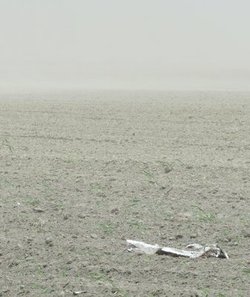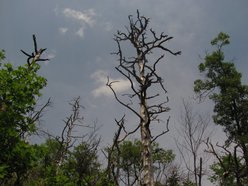
Once upon a time, there was a teenager who fell in love with a skinny guy who had black fingernails, a trench coat, and a mysterious gaze.
She was intrepid (she thought) and a romantic (who isn't?) and she had read the YA romances--Twilight and Bitten (sometimes classified as YA) and so many others that call for messed up people getting together and keeping each other sane through crazy plot action. Even the music that she grew up with--”You Drive me Crazy,” and “Vermillion,” and “Imaginary,” and boatloads of '90s band songs—told her that creepy stalker types are mysterious and fascinating.
These stories and songs envisioned lonely girls made better by morbid guys with weird haircuts. They preached that real love is the kind you can't explain—the kind that makes no sense, but you feel a pull, and you want it even though everyone you know tells you to leave it in the dirt and move on.
She flirted with her romantic anti-hero for a decade. Off and on they went, like spring and winter in New England. Sometimes they were deep, and she knew, she just knew that they would be together forever (he would take her last name, and she could wear a purple wedding dress), and at other times being around him made her feel dusty and creaky, like gnarled trees in Jericho.
She fled her homeland to escape him, and everyone else. She sought her own way, and her own people. She wanted to know that she could be loved by strangers. She met many idiot guys before finding the Bio-Engineer. They met at a blues dance, and started talking, and when he moved closer to her town, she invited him out. He got her drunk, but behaved himself, and they went on walks after that. They strolled along a pond with stone painted frogs the size of miniature horses, and sat down on a swinging bench to talk some more.
It was here that he told her that she could be an engineer if she wanted, and for some reason this made her feel good. It was the kind of good that she used to feel with Black Fingernails, when he looked at her like he liked her. It made her think that she could love Bio-Engineer. She did. He was smart. He could fix cars and motorcycles and stuff in his house; he could write long, humorous letters; he brought her out to eat, and was sweet, and there were boxes of books on his bedroom floor. They could sit in the same room for hours, each doing their own thing, and it didn't bother her. It didn't bother her.
It was obvious why she loved him. And it was easy to explain to others.
But there was still that creeping need for something more. So when she moved away from Bio-Engineer (unhappily, but necessarily for family) she returned to Black Fingernails, who was a little different from how he used to be, but not much. He still didn't read, or write, or ask questions. He still acted like he knew everything, and like he was better than everyone else. But she tried, because he was exactly what she'd pictured in a husband: someone with whom she could be near at night, and stay away from during the day, while she was writing. A solely-romantic relationship.
But he kept talking. He preached hate and Trump-isms, and everything he said was a mere belch of what someone in his family had clearly repeated to him again and again. He refused to work more than 20 hours a week, and she didn't like how he spent his money. Every practical sign told her that this was a lost cause, and she would eventually be brought down if she stuck with him.
So she let go. And now she waits for the next one, if he comes, although she still likes Bio-Engineer and wishes they could live closer. In the meantime she sees her sisters and her brother and her parents; she spends time with friends that she grew up with, but hasn't hung around in years. She hikes alone, as in meditation
She is rediscovering her East Coast self, and her single self, one story at a time.
She was intrepid (she thought) and a romantic (who isn't?) and she had read the YA romances--Twilight and Bitten (sometimes classified as YA) and so many others that call for messed up people getting together and keeping each other sane through crazy plot action. Even the music that she grew up with--”You Drive me Crazy,” and “Vermillion,” and “Imaginary,” and boatloads of '90s band songs—told her that creepy stalker types are mysterious and fascinating.
These stories and songs envisioned lonely girls made better by morbid guys with weird haircuts. They preached that real love is the kind you can't explain—the kind that makes no sense, but you feel a pull, and you want it even though everyone you know tells you to leave it in the dirt and move on.
She flirted with her romantic anti-hero for a decade. Off and on they went, like spring and winter in New England. Sometimes they were deep, and she knew, she just knew that they would be together forever (he would take her last name, and she could wear a purple wedding dress), and at other times being around him made her feel dusty and creaky, like gnarled trees in Jericho.
She fled her homeland to escape him, and everyone else. She sought her own way, and her own people. She wanted to know that she could be loved by strangers. She met many idiot guys before finding the Bio-Engineer. They met at a blues dance, and started talking, and when he moved closer to her town, she invited him out. He got her drunk, but behaved himself, and they went on walks after that. They strolled along a pond with stone painted frogs the size of miniature horses, and sat down on a swinging bench to talk some more.
It was here that he told her that she could be an engineer if she wanted, and for some reason this made her feel good. It was the kind of good that she used to feel with Black Fingernails, when he looked at her like he liked her. It made her think that she could love Bio-Engineer. She did. He was smart. He could fix cars and motorcycles and stuff in his house; he could write long, humorous letters; he brought her out to eat, and was sweet, and there were boxes of books on his bedroom floor. They could sit in the same room for hours, each doing their own thing, and it didn't bother her. It didn't bother her.
It was obvious why she loved him. And it was easy to explain to others.
But there was still that creeping need for something more. So when she moved away from Bio-Engineer (unhappily, but necessarily for family) she returned to Black Fingernails, who was a little different from how he used to be, but not much. He still didn't read, or write, or ask questions. He still acted like he knew everything, and like he was better than everyone else. But she tried, because he was exactly what she'd pictured in a husband: someone with whom she could be near at night, and stay away from during the day, while she was writing. A solely-romantic relationship.
But he kept talking. He preached hate and Trump-isms, and everything he said was a mere belch of what someone in his family had clearly repeated to him again and again. He refused to work more than 20 hours a week, and she didn't like how he spent his money. Every practical sign told her that this was a lost cause, and she would eventually be brought down if she stuck with him.
So she let go. And now she waits for the next one, if he comes, although she still likes Bio-Engineer and wishes they could live closer. In the meantime she sees her sisters and her brother and her parents; she spends time with friends that she grew up with, but hasn't hung around in years. She hikes alone, as in meditation
She is rediscovering her East Coast self, and her single self, one story at a time.

 RSS Feed
RSS Feed
